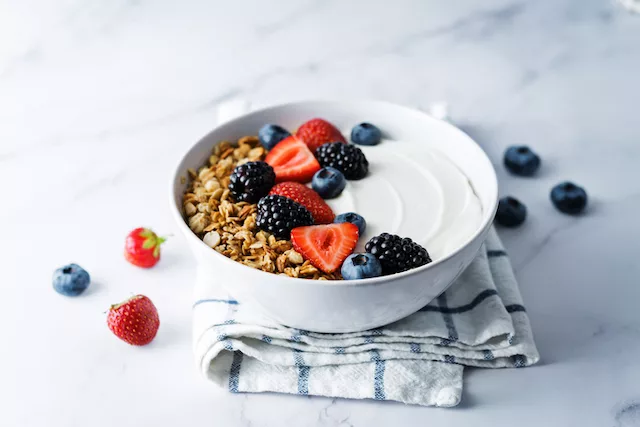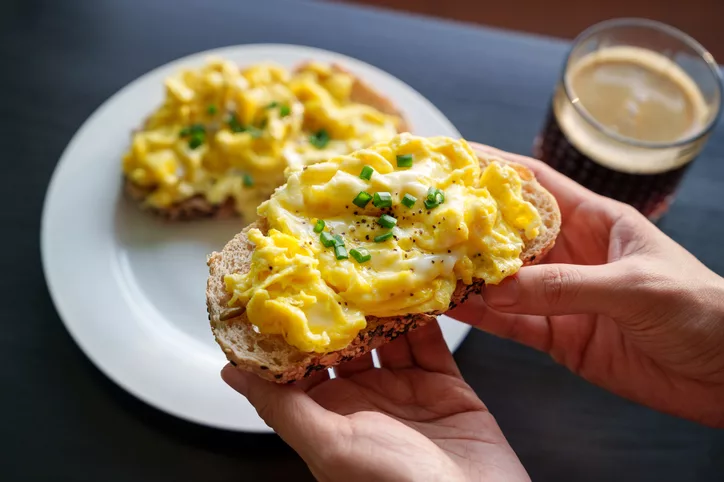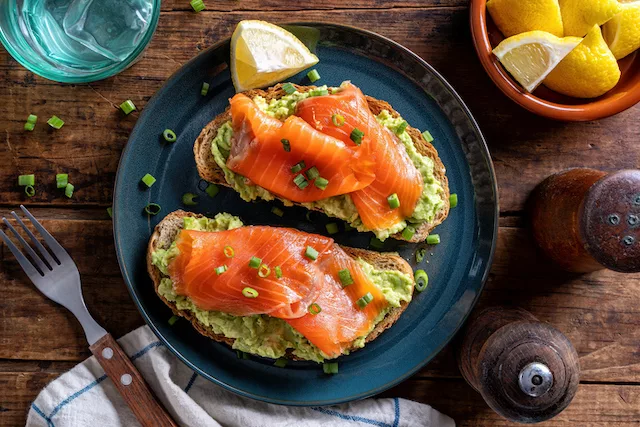We’ve all experienced bloat before—that feeling of fullness or pressure in our stomach that’s often accompanied by discomfort, swelling, and sometimes even pain. Not only is it flat-out uncomfortable, but it can also impede our ability to carry on with our day-to-day responsibilities, from work productivity to social commitments.
Here, We’re sharing a week’s worth of delicious gut-friendly, anti-bloating meals that will help reduce unpleasant discomfort.
Possible Causes of Bloating
There’s no one single cause of bloating, however, it’s most often linked to the foods we eat, according to Emma Laing, PhD, RDN, director of dietetics at the University of Georgia and a national spokesperson for the Academy of Nutrition and Dietetics. “For many people, feeling bloated is simply due to having a distended stomach – a normal response after eating that doesn’t necessarily need to be ‘fixed,’ she says. “The types of gas that can cause discomfort with eating come from the air that gets swallowed, perhaps from talking or eating/drinking too quickly, and from fermentation, which is a normal process of carbohydrate digestion by intestinal bacteria.”
One of the biggest culprits of bloating is known as FODMAPs (fermentable oligosaccharides, disaccharides, monosaccharides and polyols), types of carbohydrates found in certain foods like wheat, garlic, onions, and certain fruits, that have been linked to unpleasant stomach symptoms like gas, bloating, diarrhea and constipation.
Another major food culprit when it comes to bloating is sodium. Excessive sodium intake can cause our bodies to retain excess water, which can cause bloating and a sort of puffed-up appearance, notes Routhenstein. “Processed foods are often high in sodium—things like sweetened breakfast cereals, soda, potato chips (especially with seasonings), blended coffee beverages, energy drinks, artificially flavored crackers, etc,” she says.
For individuals with gluten sensitivity or celiac disease, foods like bread, pasta, cereal, crackers, and baked goods can trigger bloating and other digestive symptoms. Another common intolerance that can affect people and cause bloating is lactose intolerance. This is characterized by unpleasant symptoms like bloating after consuming dairy products.
Feeling bloated and uncomfortable can have a direct impact on your day-to-day life and make everyday tasks difficult. While it’s tempting to reach for some of the quick fixes you might see being marketed online and at drug stores, a more sustainable approach lies in understanding and addressing the root causes of bloating. An anti-bloating meal plan can be a game-changer, offering a structured approach to reducing discomfort and improving digestive health.
Anti-Bloating Meals Day 1
Breakfast: Oatmeal with berries and a sprinkle of chia seeds
Both oatmeal and berries are great options for reducing bloat. Oatmeal is rich in soluble fiber, which absorbs water in the digestive tract to form a gel-like substance. This helps regulate bowel movements and prevents constipation, a common cause of bloating. Berries, like raspberries, strawberries, or blueberries, add a boost of antioxidants and fiber, further aiding digestion and promoting gut health. Together, these ingredients create a nutritious and effective meal for combating bloat and maintaining digestive wellness.
Lunch: Grilled chicken salad with mixed greens, avocado, and a vinaigrette dressing
Protein helps regulate blood sugar levels, preventing spikes that can contribute to bloating as well as other issues like heart issues. Lean protein like grilled chicken, in particular, is a good choice since it’s easier for your body to digest than other lean proteins like red meat, according to research published in Frontiers in Microbiology. Having lean chicken over mixed greens can help cut down on bloating as the greens are packed with fiber. The addition of avocado is wise since this monounsaturated fat can aid in nutrient absorption and support overall digestive health.
Dinner: Salmon with roasted asparagus and sweet potatoes
Another lean protein that’s easier on the digestive system and can therefore reduce bloating is salmon. Not only that, but salmon is also a rich source of omega-3 fatty acids, known for their anti-inflammatory properties. Pairing the salmon with asparagus and sweet potatoes is even more beneficial since they’re both loaded with fiber. Asparagus also contains certain digestive enzymes that can further break down food while the potassium in sweet potato helps regulate fluid balance in the body.
Anti-Bloating Meals Day 2
Breakfast: Greek yogurt with honey and a handful of nuts

Rich in probiotics, Greek yogurt contains beneficial gut bacteria that aids proper digestion. Topping your yogurt off with fiber-filled nuts like almonds, hazelnuts, peanuts, or pecans can further aid in digestion and cut down on constipation. Honey is not only a nice way to add sweetness—it’s also a great alternative to refined sugars which can lead to gas and bloating.
Lunch: Leftover grilled chicken salad
Use the grilled chicken from the day before on top of another fiber-filled salad. If the salad dressing is light and contains ingredients like lemon juice or vinegar, it can contribute to hydration, which is crucial for proper digestion.
Dinner: Lentil soup with whole grain bread
Lentils are a great source of plant-based protein and fiber, helping to combat bloating by regulating your bowel movements and cutting down on constipation. They’re also low in fat, so they’re lighter on your stomach than some other proteins. If prepared without excessive salt, lentil soup can also be low in sodium, reducing both water retention and bloating.
Anti-Bloating Meals Day 3
Breakfast: Scrambled eggs with whole-grain toast and avocado

Scrambled eggs are a classic breakfast that’s high in protein—helping to aid in digestion and regulate sugar levels. As mentioned, avocado is rich in monounsaturated fats and is considered low-FODMAP. Last, but not least, whole-grain toast offers added fiber.
Lunch: Turkey and vegetable wrap
Turkey is a lean protein source that’s easy to digest—just make sure you opt for turkey that’s not loaded with saturated fat like some deli-meat versions. By adding in various vegetables, you’re incorporating essential fiber, promoting regular bowel movements and preventing constipation. If possible, opt for a whole-grain wrap over a white one for added fiber and nutrients.
Dinner: Chicken stir-fry with brown rice
You already know that chicken is a lean protein source that can regulate blood sugars. Adding vegetables into your stir-fry bulks up the fiber and the brown rice is a whole-grain, providing fiber and essential nutrients. For less bloat, opt for low-sodium soy sauce or tamari.
Anti-Bloating Meals Day 4
Breakfast: Smoothie bowl with spinach, banana, and almond milk
Smoothie bowls can be a wonderful option if you’re trying to reduce bloat. “Smoothie bowls can be an easy way to include vitamins, minerals, and antioxidants, which can support overall health, including heart health by providing nutrients like potassium and fiber that help manage blood pressure,” says Michelle Routhenstein, R.D.N., Registered Dietitian Nutritionist and Preventive Cardiology Dietitian at EntirelyNourished.com. Spinach is high in fiber and bananas are rich in potassium, both of which further help cut down on bloat.
Lunch: Leftover lentil soup
Opt for some leftover lentil soup from two days before. It should last about 3-5 days in the fridge when stored in an air-tight container.
Dinner: Grilled shrimp with quinoa and steamed broccoli
Shrimp is a low-fat, high-protein food that’s surprisingly gentle on the digestive system. Combining it with the complete protein, quinoa, is a good choice, since it’s loaded with fiber, as is the broccoli. Steaming the broccoli can provide additional benefits, since this cooking process allows the vegetable the ability to retain the majority of its water content, upping your hydration. “Steaming, roasting, or sautéing the vegetables breaks down part of the plant fibers and makes them easier to digest,” says Laing.
Anti-Bloating Meals Day 5
Breakfast: Whole-grain toast with avocado and a fried egg
A similar breakfast to day 3 is this combo, but you’re switching things up by frying the egg. Opt to use avocado oil to aid in nutrient absorption.
Lunch: Chicken Caesar salad with romaine lettuce
With chicken as the lean protein source and romaine as the fiber-filled star of the show, a Ceasar salad can be a healthy lunch option that can cut down on bloat. Just be sure to opt for a Caesar dressing that’s not too high in sodium and fat. You could skip the Caesar dressing altogether by swapping in a blend of olive oil, lemon juice, and Dijon mustard.
Dinner: Baked cod with roasted Brussels sprouts and sweet potatoes
Like salmon, cod is a lean fish, providing protein without excessive fat, which can cut down on bloating and help regulate blood sugar levels. Both Brussels sprouts and sweet potatoes are great sources of fiber, but Brussels sprouts come with the added benefit of enzymes that further break down food and reduce bloating. It’s worth pointing out, however, that individuals with IBS should avoid Brussels or other cruciferous veggies, as these can lead to more bloating than less, warns Laing. “For example, if you have suddenly started eating a lot more of these vegetables (or vegetables in general) than you’re used to eating, the high fiber content can cause GI discomfort if your body is not used to this amount,” she says.
Anti-Bloating Meals Day 6
Breakfast: Oatmeal with berries and a dollop of Greek yogurt
As already mentioned, oatmeal is a fiber powerhouse, berries add in even more fiber and Greek yogurt offers up a serving of probiotics that support health and digestion.
Lunch: Leftover chicken stir-fry
At lunchtime, enjoy some leftover chicken stir-fry from a few days before.
Dinner: Salmon with roasted asparagus and quinoa
The lean protein from the salmon coupled with fiber-rich asparagus and quinoa is a great bloat-busting meal. The asparagus also contains digestive enzymes that further break down food in the body and quinoa is a good source of potassium, an electrolyte that helps regulate fluid balance in the body.
Anti-Bloating Meals Day 7
Breakfast: Scrambled eggs with whole-grain toast and smoked salmon
Scrambled eggs and smoked salmon offer up protein while whole-grain toast serves up fiber. Just be sure to opt for smoked salmon that is lower in sodium, ideally opting for fresh rather than pre-packaged.

Lunch: Tuna salad wrap
Tuna is a lean protein source and turning it into a tuna salad with veggies like celery or onions increases your fiber intake. To further cut down on bloating, opt for tuna packed in water rather than oil and use a light mayonnaise or a Greek yogurt-based dressing. For the wrap, opt for whole wheat.
Dinner: Grilled chicken breast with sweet potato fries and steamed green beans
Grilled chicken breast serves up some lean protein. Sweet potatoes and green beans are great sources of fiber too when prepared with minimal salt. This meal combo can be super effective at reducing unpleasant bloating.
Anti-Bloating Snack options
Throughout the day and in between meals you might get hungry. If so, here are some snacks that won’t cause bloat:
Fruits like berries, apples, or pears
These fruits are rich in fiber, offering a refreshing and nutritious way to combat bloat by helping to regulate your bowel movements and prevent constipation. Their high water content contributes to hydration, while the fiber content promotes regular bowel movements.
Vegetables like carrots or cucumber sticks
High in water content, these vegetables contribute to hydration and can help flush out excess sodium. They also provide fiber for digestive health.
Nuts and seeds (in moderation)
Offering up both healthy fats and fiber, nuts and seeds are great for supporting digestive health. They should, however, be consumed in moderation as they can be high in fat and potentially contribute to bloating for some individuals.
Greek or plain yogurt
A good source of protein and probiotics, plain yogurt can support gut health and digestion. Those with lactose intolerance should opt for dairy-free alternatives.
Hard-boiled eggs
Eggs are lean sources of protein, helping to regulate blood sugar levels and prevent spikes that can contribute to bloating. They are also low in carbohydrates, making them a suitable option for those watching their carb intake.
The Takeaway
While this meal outline is just a friendly guide to help you out, there are other ways to mix and match equally healthy foods. Don’t forget to take your FLATTER ME digestive enzyme with your biggest meal of the day to combat bloating in 30 minutes or less!
